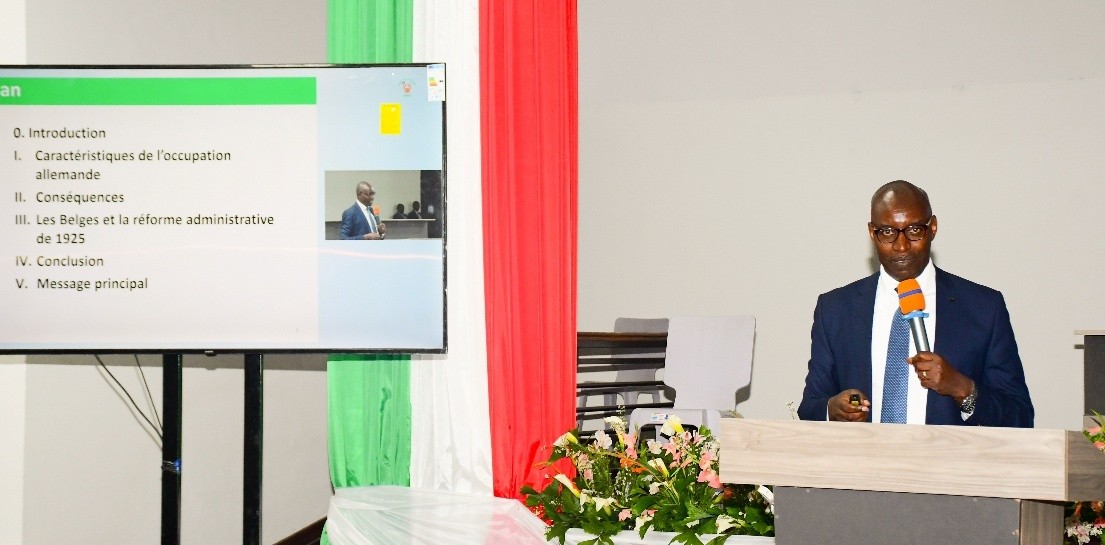BUJUMBURA, February 7th (ABP) – Various presentations on the colonial period in Burundi were given at a public conference on 28 January 2025 organised by the Senate of the Republic to publicise the results of research into that period, which had a negative impact on Burundi and its people.
The presentations were made by Aloys Batungwanayo, doctoral student, research historian and expert in transitional justice; Jean Bosco Manirambona, anthropologist and lecturer at the University of Burundi (UB); Elias Sentamba, political scientist and lecturer at the UB; Professor Léonidas Ndayizeye, lecturer and economist at the UB; and Jean Baptiste Bukuru, doctor of international law and lecturer at the UB.
Their presentations focused respectively on the historical aspects of German colonisation and the effects of the administrative reform of 21 August 1925 in Burundi; anthropological observations of human rights violations by the colonisers; the political and sociological aspects of the administrative reform of 1925 in Burundi; the socio-economic effects of German and Belgian colonisation; and the legal aspects of German and Belgian colonisation.
The speakers highlighted the consequences of German colonisation and the administrative reform of the law of 21 August 1925 in all sectors of national life. The economic consequences of colonisation in Burundi included the ethnicisation of Burundian society, which destroyed the Burundian nation-state; the socio-political crises that led to crime, exile and underdevelopment; the destruction of the cultural, political and social foundations that were the pillars of Burundi’s stability; and the antagonism between the Bahutu, Batutsi, Batwa and Baganwa.
In social terms, the speakers revealed that the Bahutu had been excluded from all sectors of the country as a result of the implementation of the 1925 administrative reform. On the eve of independence, all the chiefdoms and sub-chiefdoms came under the governance of Baganwa and Batutsi chiefs and sub-chiefs, chosen for their loyalty to the king and above all to Belgian authority. The Belgian colonial administration’s policy of “divide and rule” ruined the social cohesion enjoyed by Burundian society, by favouring the Baganwa and Batutsi on the one hand, and sidelining the Bahutu and Batwa on the other, it was pointed out.
Legally speaking, the Bagabo and Bashingantahe, who traditionally guaranteed justice and social harmony, were excluded from the judicial system. The Bahutu were excluded from the judiciary, even though they traditionally took part in the administration of justice in the same way as the Batutsi. Their exclusion continued because of their exclusion from the administrative section of the Astrida school and administrative group, which trained the first Burundian administrative staff and judges during the Belgian administration.
In the same vein, the Mwami (king) was deprived of his constitutional prerogatives to deliver justice as a last resort; he was subjected to the control of the resident and even reduced to the title of assessor. The Belgian administration, in collaboration with Belgian Catholic missionaries, arrogated to itself the right to determine the applicable custom. Certain customs were liable to be disregarded because they were deemed barbaric and satanic by the colonisers.
Cruel, inhuman and degrading punishments were introduced as disciplinary punishments, such as whipping and imprisonment. The whip was administered so cruelly that a large proportion of the population was forced into exile. The prison sentence was applied in superhuman conditions, to the extent that some prisoners died, it was lamented.

The economist Léonidas Ndayizeye, for his part, pointed out that in Burundian culture, especially in colonial times, the cow had a multifaceted value affecting different aspects of the social, economic and cultural life of society. On the basis of the fine of 424 cows that King Mwezi was obliged to pay to the Germans, Ndayizeye estimated, on the basis of debatable hypothoses, that today there are 55,574,528 cows, including 52,428,800 females and 3,145,728 males.
“History and the facts clearly show that colonisation had a twofold but never declared objective: that of enriching the colonising countries by despoiling the colonised territories in all spheres of life in those territories, in particular land, mineral wealth and even people,” concluded Ndayizeye.

